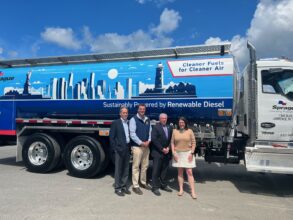Food and Fuel for Thought
The National Biodiesel Conference in Orlando, Fla. in early February was an incredible, profound success. Many of the estimated 4,000 attendees attended the kick-off Super Bowl party. Unfortunately for me, I sat with New York Giants fans.
For heating oil marketers, seeing the Industry Partnership award presented to NORA, the National Oilheat Research Alliance, was particularly profound. NORA created the trademark Bioheat logo in collaboration with the NBB, the National Biodiesel Board, in 2006 after five years of research, development and most importantly, training. This has led to a quality controlled national unified distribution process for heating oil blends, up to and most commonly B5 (5 percent biodiesel, 95 percent petroleum heating oil). These joint efforts have led to the almost certain inclusion of up to 5 percent biodiesel in the ASTM specification D-396.
The conference did not dodge the nagging quality issues. The quality issues have been largely conquered. NREL, National Renewable Energy Laboratory, announced that 90 percent of samples obtained from spring 2007 to fall 2007 were on spec. Please note that is much better than in 2006 when 50 percent of samples were off- spec.
There is also a very good chance that there will be an approved specification for higher biodiesel blends from B6 to B20. The B5 spec is expected to be also approved for on-road diesel ASTM D-975. A tough new spec currently being used is seen to be a vital link to the acceptance of a B6 ‘ B20 spec commonly called the ‘Minnesota Cold Soak Test.” This test screens out a common problem of a ‘gelling type” event that has been seen well above the normal cloud point.
Another award winner for Inspiration was David Harris from Harvard University. When Harvard started five years ago with B20 and was the liaison to the Environmental Protection Agency’s Greater Boston Breathes Better Group, many entities like the city of Boston, Cape Cod Regional Transit and Cape Cod National Seashore soon followed.
So where is the beef relative to food vs. fuel? Feedstock diversity and rapid crop yield improvements. Algae are a hot new fuel source, as are many plants that grow on non-farm areas. In attendance were many crop scientists, engineering gurus and the like. Biodiesel is drawing many of the best brains in the world. Two other award winners deserve mentioning: Cummins Engine for innovation in approving B20 in their diesel engines and providing clear standards and procedures for their dealers and customers; and finally, Barry Smallwood of the U.S. Marine Corp. was recognized for leading the charge for a 28 percent reduction in petroleum usage. Some 90 percent of bases now use B20.
While I’m still amazed at the new, large genetic scope of this industry-the science and technology, I remain in awe of some early pioneers. The first biodiesel plant to be ASTM certified to the best of my knowledge is Pacific Biodiesel, owned by Bob King and his wife Kelly in Maui. A diesel mechanic with an electric generator business, Bob was trying to stop fires from restaurant grease and improve landfill operations. Now a worldwide plant builder, he remains committed to a community based plant which is fed by local feedstock. This is very viable and more importantly economically and environmentally sustainable. Fundamentally, the rationale holds for mega biodiesel industry in terms of an American community. You also know the industry is getting mega big because there is now a biodiesel political action group, PAC. The PAC is led by another visionary: Gene Gybolis of Boston based company World Energy.
It is a great thing that so many smart Americans are thinking about growing more food and growing more fuel.
Ed Burke is chairman of the board of Dennis K. Burke, Inc., one of New England’s largest suppliers of diesel fuel, gasoline and motor oil products. The family-owned business has over 45 years of reliable service. Over the past few years, Ed has been asked to speak at industry events (including the NACS Conference) on the benefits of Biodiesel fuel and recently testified before Congress on behalf of E-85 Ethanol retailers. Ed shares a unique marketing experience regarding bringing the environmental niche into the mainstream oil market. His company specializes in lowering emissions, and the company’s gas station has the distinction of being the first in Massachusetts offering Biodiesel at the pump. Once permitting is completed, the station will be the first in the state to offer E-85 at the pump. Burke supplies many of the area’s largest Biofuels users, like Taunton State Hospital, which is the state’s largest Bioheat user. To keep pace with growing demand, the company recently opened a Biofuels Supply Facility in Holyoke, Massachusetts. On the regulatory side, Ed was very busy preparing customers for the Off-Road Diesel Sulfur (NRLM) transition last summer and fall. From E-85 Ethanol to Biodiesel, Ed brings a ‘real-world” experience and perspective to the new fuels and equipment.
THE EMISSIONS EXPERTS | 284 Eastern Avenue | Chelsea, Massachusetts 02150
1-800-289-2875 www.burkeoil.com


